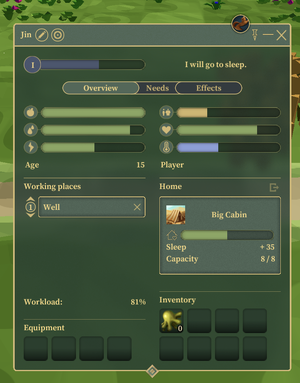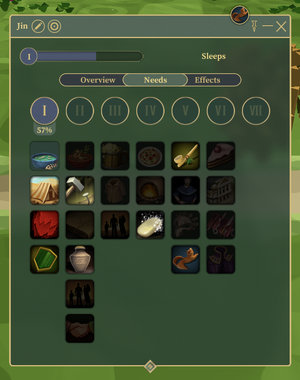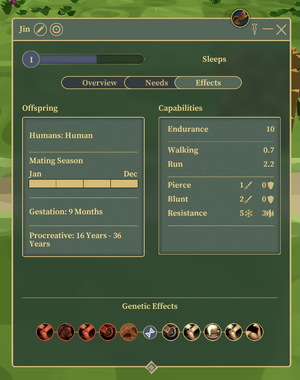Citizens
In Of Life and Land, citizens play a crucial role in your settlement. While you can't control them directly, they autonomously tend to their needs and responsibilities based on their jobs and living conditions. You have the power to influence their work locations and hours. Fullfilling their needs is key to advancing in the game and achieving higher levels.
Overview
If you click on a person, an information window opens. In the overview tab you can access details about their health, status, and contributions to your community.
- Level of Progression: This indicator showcases the person individual needs level and progression.
- Current Activity: Here, you can see what the person is currently engaged in within your settlement.
- Current Health: The health status which have impact on their well-being and productivity.
- Age: The persons age is displayed, allowing you to monitor their aging and plan accordingly.
- Faction: Displays the faction the person belongs to.
- Work place: Shows the number of working points and the workload in %. A high workload can mean that the lower priority tasks are not checked often, while a low workload leads to a lot of free time. Citizens can have multiple job assignments, with priority settings determining their primary role. When an inhabitant has more than one workstation, this section displays which workstation takes priority.
- Home: Shows the comfort level of the current home of a person.
- Equipment: Currently equipped items.
- Inventory: Includes items they're carrying or storing.
Needs
| See also: Needs |
In the needs tab you can see the persons progression and need level. If a level reached 100% it will unlock the next need level. Fulfilled needs slowly fill the share up to a certain point.
Unfulfilled or neglected (red) needs reduce the amount. If it falls below -100%, the level is lost.
Effects
The Effects tab displays the individual genetic characteristics of the citizens.
Body heat
All existing things are influenced by the temperature. Humans and animals have different strategies on how to influence their body heat.
For example:
- Clothing and quality of clothing
- Where they sleep. Better houses have better insulation and some can even be heated. People can usually recover and regain HP while they sleep.
- Whether they sleep alone or with other people or animals. For example, they can cuddle for extra warmth (and mental states).
- How well fed they are. They can warm up by burning calories (shivering). And they can cool down by sweating (body water)
- How much body fat they have (extra insulation and energy reserves)
- Paths and village efficiency: The longer people have to walk in the cold/heat, the worse it is.
- Shade and cover on your paths and workstations: For example, trees protect you from cold winds and provide shade. Flat terrain is usually the worst. In certain biomes planting trees can make a big difference.
- Sources of heat/cold: People can warm up in certain places (e.g. fireplace).
- Various effects, such as if they are old, young, happy or have special mental states.
- Special strategies like lower the body working temperature or to endure extreme cold without much movement.
Get new people
There are many ways to get new people to your town:
- Immigration: You need a community centre to accept new people
- Quests
- Children: Your villagers must be at level 3, of the correct age, their needs must be satisfied and the village needs to have empty houses. It takes 9 months to have a child.
- Diplomacy: You can ask other factions to join you
Age
- 5+ Humans from the age of 5 can help with community tasks.
- 8+ Humans form the age of 8 can help at workplaces.
- 0-12 Humans from the age of 0 to 12 have the young state.
- 40+ Humans form the age of 40 or more have the old state.
- 50+ Humans form the age of 50 or more have the decrepit state.
| Humans, Animals |
|---|




